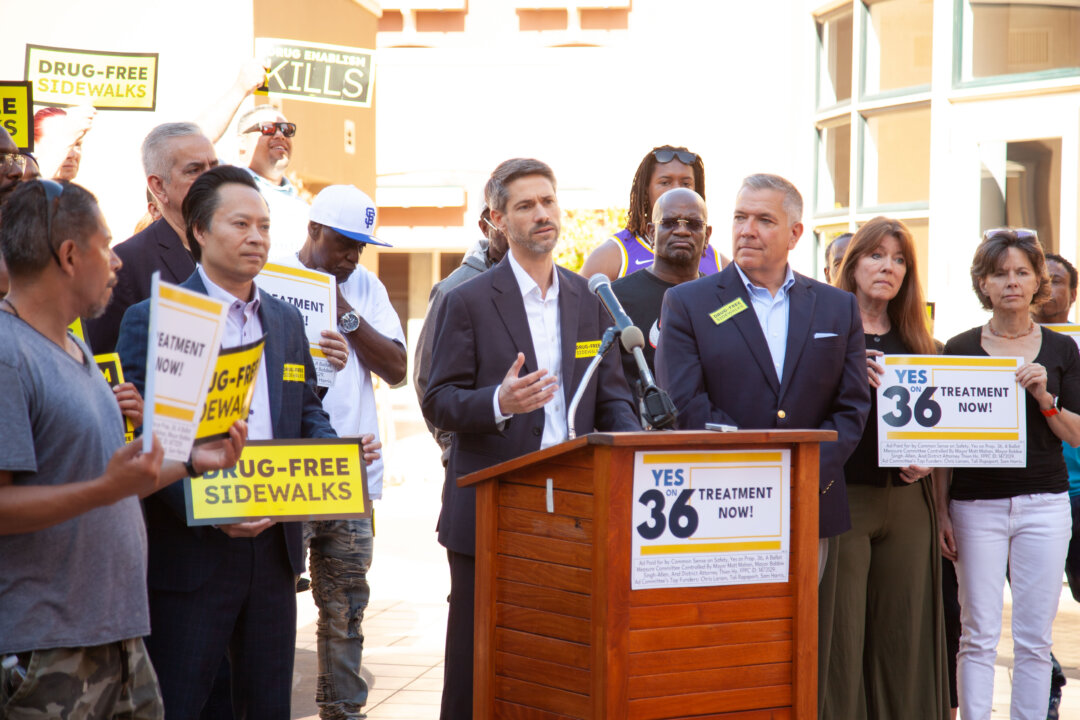If passed by voters in November, Proposition 36 would reform the controversial Proposition 47 and toughen penalties for some drug and theft crimes.
In November, California voters will decide on Proposition 36—a ballot measure that would toughen penalties for some drug and theft crimes—which has sparked debate over the future direction of the state’s criminal justice system reform.
Prop. 36, known as the Homelessness, Drug Addiction, and Theft Reduction Act, was initiated by the California District Attorneys Association. It would reintroduce the three-strikes principle for certain property crimes, and a third conviction for shoplifting could be elevated to a felony charge.
In the case of drug offenses, Prop. 36 would give prosecutors discretion to offer offenders an option to receive drug addiction treatment instead of going to jail.
“People tend to adjust their behaviors according to the laws and requirements. Tightening up the law a little bit in these aspects is imperative, given our current chaotic situation,” Frank Lee, vice president of California Coalition Against Drugs, a community group backing the measure, said in a Sept. 27 virtual press conference.
Prop. 36 would require offenders to complete drug rehab treatment, as opposed to previous measures that only required offenders to check in, according to Lee.
“After drug addicts get rid of their drug habits, they will not keep stealing or robbing money to buy drugs. They also will not be hanging around on public streets as homeless people. So this [proposition] is killing three birds with one stone,” Lee said.
Related Stories


Passed by California voters in 2014, Proposition 47, aiming at reducing California’s prison population, changed some theft and drug crimes from felonies to misdemeanors, including theft of items up to $950 and possession of hard drugs.
Tom Wolfe, a recovering heroin addict who was formerly homeless in San Francisco, told The Epoch Times on Oct. 3 that by doing that, “we’re just letting people back out onto the street, they’re falling back into addiction, and now they’re dying because of drug overdose due to fentanyl.”
Wolfe has been sober for six years and currently works as a recovery advocate in San Francisco. He was arrested six times in 2018. He was released right away the first five times, and then he got arrested and charged with a felony.
He then remained in jail for three months, which gave him a chance to get sober, and he was given the choice to either stay in jail longer or stay sober.
“Prop. 36 offers a real opportunity, for people that are breaking the law to support their addiction, to find a pathway to treatment, or to find an off-ramp to treatment,” Wolfe said.
Common Sense for Safety, a pro-Prop. 36 campaign initiated by San Jose Mayor Matt Mahan, Sacramento District Attorney Thien Ho, and Elk Grove Mayor Bobbie Singh-Allen, promotes the measure as a way to address drug and homelessness issues in California.
“We’re now joined by nearly 200 locally elected Democrats and independents in nonpartisan offices, including 64 Democratic mayors across the state of California in support of Proposition 36,” Mahan said at an Oct. 3 rally, adding that the measure “brings some much-needed balance and new tools back to our system.”
“The Democratic Party I know has championed the causes of working families, of racial justice, of immigrants aspiring to realize the American dream. And when we are at our best, we do all of those things by embracing common sense solutions,” Mahan said.
Oppositions
Gov. Gavin Newsom and several Democratic lawmakers previously said that Prop. 36 is going too far in reforming Prop. 47.
After they failed to negotiate Prop. 36 off the ballot earlier this year, they proposed in late June a counter-ballot measure that features a more moderate reform but dropped it a day before the July 3 deadline for the state Legislature to put initiatives on the ballot.
“For months, attempts were made to engage the California District Attorneys Association in this effort” to retract Prop. 36, Newsom told The Epoch Times in an emailed statement on Oct. 3. “They refused, opting to instead push a ballot measure that would revive policies from the era of mass incarceration and the failed War on Drugs.
“Despite these efforts and having the votes necessary to pass the measure, we are unable to meet the ballot deadline to secure necessary amendments to ensure this measure’s success and we will be withdrawing it from consideration.”
Crime Trends After Prop. 47
A milestone in California’s criminal justice reform, Prop. 47 turned several crimes from felonies into misdemeanors, invalidating the three-strikes rule for those crimes.
“We have defendants that come in with a calculator, and they know exactly that the amount is going to be just under $950. They can commit that crime 54 times … without any additional consequence,” San Diego County District Attorney Summer Stephan said in the Sept. 27 virtual press conference.
In San Francisco, rampant shoplifting has reportedly forced multiple grocery stores and retail stores to close, including Whole Foods, Walgreens, Target, and others.
He said people don’t believe it’s declining because they are “bombarded with imagery from public cameras making us feel that crime is out of control.”
Recent Poll
An Oct. 4 poll by the University of California, Berkeley, shows that 60 percent of likely voters support Prop. 36.
The poll, conducted by the university’s Institute of Governmental Studies, found that Republicans and conservatives “offer nearly universal support for the initiative” while 47 percent of Democrats support it.
“Prop. 47 was an abject failure,” San Francisco Police Department Sergeant Rich Cibotti said in an email to The Epoch Times. “It was sold to voters as the ‘Safe Neighborhoods and Schools Act,’ yet since then we can’t walk into a store and buy toothpaste without getting a clerk to unlock it for us.”
Prop. 36 may not be able to fix all of California’s problems, Cibotti said, but he thinks “it’s a big step in the right direction.”
Travis Gillmore contributed to this report.

















































